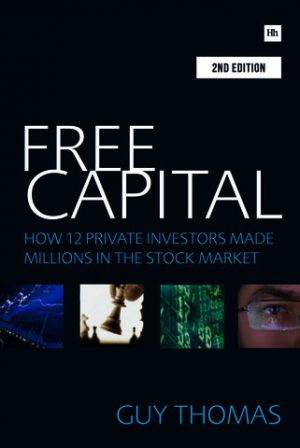
Wouldn?t life be better if you were free of the daily grind ? the conventional job and boss ? and instead succeeded or failed purely on the merits of your own investment choices?
Free Capital: How 12 Private Investors Made Millions in the Stock Market offers an insight into this life.
Based on a series of interviews, the book profiles 12 serious private investors. Six are ?ISA millionaires? who have accumulated over £1m in an ISA ? a result which is arithmetically impossible without exceptional investment returns. Around one-third are ex-City professionals; one-third are other degree- educated professionals; and one-third left school at or before 18. Most gave up their day jobs in their 30s or 40s to be full-time investors.
Horses for courses
The 12 investors follow a wide range of approaches. Some (called ?geographers? in the book) focus mainly on top-down analysis of markets and trends; others
( ?surveyors?) focus mainly on bottom-up analysis of individual companies. Some are very long-term investors who make only a handful of trades each year; others are short-term traders who make dozens of trades every day.
In most cases there are clear links between the investors? methods, their personality and career backgrounds. The biographical format of the profiles draws out these connections, encouraging the reader to reflect on which approach might suit their own skills and personality.
Common traits
Despite the wide range of approaches, there are also some common features in most of the investors? stories. Some of the similarities identified in the final chapter of the book are as follows.
Future time perspective: From an early age, the investors have been focused on the future. They have always given high priority to learning, earning, saving and investing.
Mainly smaller companies: All but one of the interviewees invests mainly in smaller companies. They largely ignore the top 90% of the stock market by market capitalisation.
No overnight success: Most interviewees spent several years as mediocre investors, learning by making mistakes. This pattern is not inconsistent with eventual success as an investor.
Money as a means to freedom, not consumption: The investors have always lived modest lifestyles relative to their accumulated wealth. They see investment as means to freedom, rather than a source of ostentatious spending power.
Low appetite for leverage: Most of the investors use little leverage. Some have spread bet accounts, but this is motivated mainly by tax considerations rather than a desire for leverage.
Independence: The investors all work alone. They prefer to figure things out for themselves, rather than seeking advice. They are definitely not team players.
Investment as a craft, not a science:
The investors use relatively simple analysis and rules. None relies on modern portfolio theory as understood in the academic world (?like learning physics to play snooker? said one interviewee), or on any other sophisticated quantitative analysis. This is despite the fact that several have strong quantitative backgrounds.